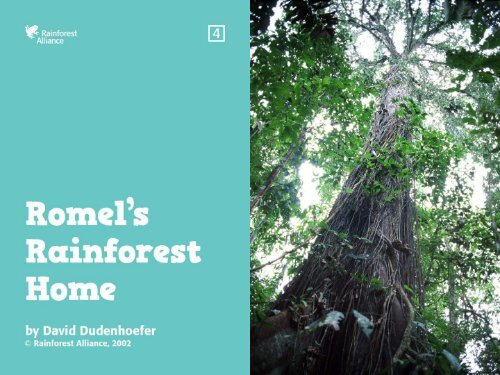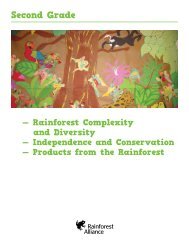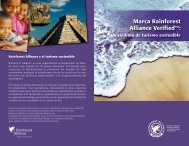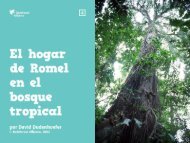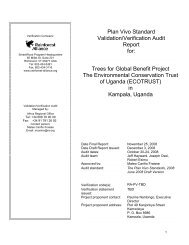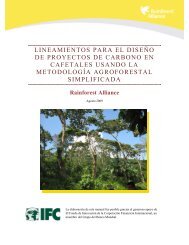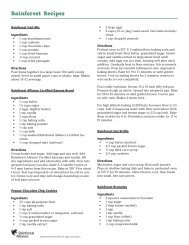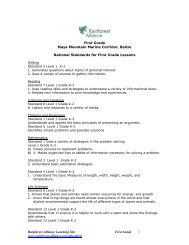Urakepe - Rainforest Alliance
Urakepe - Rainforest Alliance
Urakepe - Rainforest Alliance
- No tags were found...
Create successful ePaper yourself
Turn your PDF publications into a flip-book with our unique Google optimized e-Paper software.
<strong>Urakepe</strong>. Hello. My name is Romel. I’m a ChachiIndian. I live in the village of San Salvador, in westernEcuador. I have five brothers, two sisters, andlots of cousins.
There are about 60 families in San Salvador, andmost are bigger than mine. They live in housesspread along the Río Sucio, the main river in thisarea. Río Sucio means “Dirty River,” but half theyear, the water is pretty clear. It only gets muddyduring the rainy season, especially after big storms,when it rises and flows really fast. In the dry season,it’s so shallow you can walk across it in manyspots.
Our house is right in town, between the soccerfield and the river. I’ve lived in San Salvador all mylife—I’m 13—so I know this area pretty well. I’veexplored most of the farms around here, and a lotof the rainforest. On most of the flat land alongthe Río Sucio there are farms where people growcacao and other crops, but the mountains that surroundthis valley are covered with rainforest. Mydad and I go hunting in those forests for paca,agouti, guans and other animals. I go there alonesometimes too, just to look for wildlife.
We’ve got all kinds of animals around here—snakes,coatis, tarantulas, tamanduas—but it’s hard tosee them. You have to be real quiet, and walk far.Some animals are easy to see, though—lizards andbutterflies are all over the place. Other animalsmake so much noise you can’t miss them. Howlermonkeys growl from the treetops, and birds likeparrots, toucans and oropendolas squawk or sing,but they don’t stay still.
I’d like to hike in the forest every day, but I have togo to school and work on our farm. I’ve always gotchores to do. Sometimes I have to get water fromthe river or cut firewood before breakfast.I usually eat boiled plantains or cassava for breakfast,maybe with a piece of paca meat, or a duckegg. The good thing is, I live close to school. Somekids have to walk an hour to get there, and if it’sraining, they show up pretty wet.
I like school, even though it can be hard. WeChachi speak Chapalachi, but the books are all inSpanish, because that’s the official language of Ecuador.In Spanish, “good morning” is “buenos dias,”but in Chapalachi, it’s “urakepe nene.” Pretty different,aren’t they? Luckily, our teachers are Chachi,so they can explain things in Chapalachi if wedon’t understand.
When I’m not in school, I like to play soccer or volleyballwith my friends. Most days, though, I haveto work on our farm. Like everyone in San Salvador,my family grows cacao to earn money andother crops for food. We have a giant garden plantedwith bananas, plantains, limes, cassava, taro,beans, sweet potatoes, sugar cane, papaya, guava,avocado, peach palm, soursop, pineapple and chilipeppers.
We grow most of what we eat, but the teachersfrom my school also have a little store in town. Myteacher said that they don’t earn any money fromthe store, but they run it to help our community.We never had a store before they opened a fewyears ago. They sell things like rice, salt, candles,cooking oil, batteries and best of all, candy.
Most of our farm is planted with cacao trees. Iprefer harvesting cacao to working in the garden,because cacao grows in the shade of bigger trees,so it’s cooler. There are also lots of birds, and I liketo listen to them sing while I work. I look for theripe pods, bright orange and yellow, hanging fromthe branches. I usually knock the high ones downwith a bamboo pole, but sometimes I have toclimb up for a pod that won’t budge. I cut the podsopen with my machete and dump the seeds into abucket.
The seeds are surrounded by white fruit that’s reallysweet. I suck on them when I’m hungry, butI never bite, because they’re really bitter. Whenthey’re fresh, the seeds are purple, but after wedry them in the sun, they turn dark brown. Sometimesmy mom grinds seeds and mixes the powderwith hot water and sugarcane juice. It’s great, but Idon’t get to drink it very often because we need tosell our cacao.
During the rainy season, I help my father andbrothers load up our dugout canoes with bags ofcacao seeds and we float down the river to theroad. There we catch a bus to Esmeraldas, a bigport city. We sell our cacao and but things likerubber boots, clothes, machetes and other tools.Sometimes my dad buys me chocolate, which whatthey make from cacao. I think chocolate is probablymy favorite food.
I like going there, but I wouldn’t want to live in Esmeraldaseven if I could eat chocolate every day.It is interesting—there are all kinds of people, lotsof shops, and everyone has electric lights, stereosand TV sets—but it’s too noisy and crowded forme. There are hardly any trees or birds in the city.There aren’t many Chachi either, since most of ourpeople live more than 100 kilometers northeast ofhere, around the Cayapas River.I’ve never been to the Cayapas area, but my UncleBenito has. He’s the president of San Salvador, sohe goes there to meet with the other leaders of theChachi Federation. My uncle says we Chachi needto be organized, because we’re a minority. Thereare less than 8,000 Chachi in all of Ecuador.
My grandfather says that when he was a boy, theChachi were about the only people in this area.Now there are lots of people from other partsof Ecuador. The problem is that they’re cuttingdown all the forest. Along the road to Esmeraldas,the hills are practically bare. You don’t see anybig trees like the ones around San Salvador. WeChachi couldn’t live without the rainforest. The forestgives us most of the things we need. We useit wood, leaves and vines to make our houses, canoes,baskets and hammocks. We hunt in them forthe animals we eat. Even our medicines come fromthe forest.
For us, the rainforest is like a living being. Weknow we need to preserve it. But all around uspeople are destroying it. There are even a bunchof outsiders who have moved onto Chachi landand are cutting down trees. Our territory is partof the Mache-Chindul Biological Reserve, so myuncle is trying to the get the environmental ministryto make those people leave. But he said gettingthe government to help us Indians is like trying tomake a turtle run.
My uncle thinks private organizations might helpus more than the government does. He’s lookingfor groups that could help us improve our school,or bring tourists to San Salvador. He and my dadare working with Conservación y Desarrollo to improveour farms. They’ve shown us how to producemore cacao by stopping the diseases and peststhat attack the trees. They’re also teaching us howto dry and store the seeds better, so we can getmore money for them. My uncle has always complainedthat we don’t get a fair price for our cacao,but maybe we finally will.
I’m proud of my uncle. Sometimes I sit in the backof our town meeting and watch him speak. He saysthat when I’m older, he’ll take my to Cayapas for ameeting of the Chachi Federation. I told him oneday I’ll be president of San Salvador, just like him.


